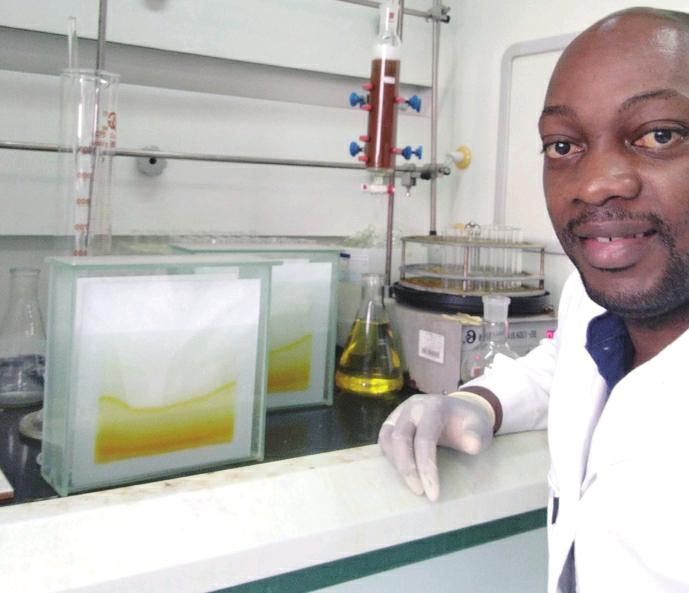The Plant Ambassador
2017-06-15ByMikeAggrey
By+Mike+Aggrey
You could say the roots of my association with China grew in the backyard of my home in Accra, the capital of Ghana. Back home, people also use herbal medicine for various diseases. I would say about 70 percent of Ghanaians use roots and shoots of herbs as the fi rst line of treatment. But the scientifi c aspect of the treatment is not so well developed in Ghana. Not everyone who uses herbs knows what the exact dosage should be. So when the Kwame Nkrumah University of Science and Technology in Ghana established a course attaching science to the use of herbal medicine, I was intrigued and signed up.
I am interested in refining and modifying traditional dosages into modern, more accurate ones. Both China and India have a well-developed traditional medicine system, and I was interested in both. But the Chinese Government offers scholarships to Ghanaians, and that tilted the balance. I did a masters degree in Chinese materia medica, or traditional Chinese pharmaceuticals, at the Tianjin University of Traditional Chinese Medicine (TCM) over three years beginning in 2010. And now, I am in Shanghai, doing a Ph.D. to research new drug development leads from African medicinal herbs.
Shanghai doesnt feel like many other parts of China. Its more cosmopolitan, more Westernized. Local people are more educated and open-minded. However, despite the advancements, Africa remains a mysterious place to them. So I am not only a researcher in Shanghai, but also a Ghanaian ambassador, telling people more about the country I come from.
While taking a taxi one summer, I asked the driver to switch on the air-conditioner. In response, he turned around, gave me a look of incredulity and asked, “Isnt it hotter where you come from? Isnt your skin dark because of the sun?”
I explained to him patiently that in Ghana, summer temperatures stay between 25 and 33 degrees Celsius, whereas in Shanghai, they shoot up to 40 degrees.
The kind of interaction that I enjoy more is talking about traditional African medicine. Once I was unwell and went to a clinic. The doctor, seeing I was a foreigner, asked me if I would like to be prescribed Western medicine or TCM. I said, “We also have traditional medicines in Ghana, so please give me TCM.”
She was surprised and then curious. She wanted to know more about the traditional medicine in Ghana, especially how it was different from TCM. I told her TCM is more developed and institutionalized. It has a fi rm system, complete with the concept of yin and yang, which together provide perfect balance. You fall ill when the balance is upset. Then there are the five elements—wood, fire, metal, water and earth—one of which prevails over the others from time to time.
In Ghana, we have something called koko. When you suffer from koko, it could be an ailment related to anything from food to the environment and age. However, ultimately we all end up using herbs.
The lab where I do part of my research has Chinese researchers familiar with African plants, and they also show a lot of interest in African herbal medicine. When Chinese scientist Tu Youyou became one of the three recipients of the Nobel Prize in Physiology or Medicine in 2015 for her formulation of artemisinin, the anti-malaria drug derived from the sweet wormwood plant, it struck a special chord.
Malaria remains the number one cause of death among children aged below five and pregnant women in Africa, and we too have a herbal treatment for the disease. We make a decoction from the root of a creeper known as nibima in Ghana, which is generally drunk three times a day.
The recent work in malaria treatment I saw in Ghana combines both herbs, using them alternately so as to prevent the malarial parasite from becoming resistant to treatment. To me, that is a perfect example of yin and yang. Together, we can do wonderful things.
